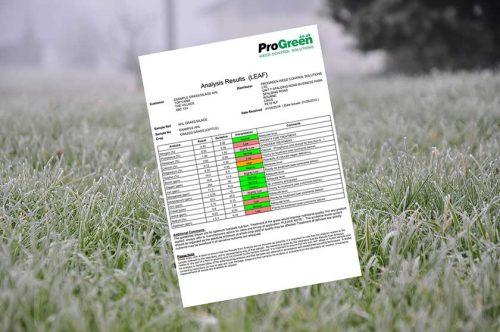The Importance of a Soil Analysis
Ensuring that you have healthy soils and good pH levels is often overlooked, however, soil nutrients and the availability of them is a crucial factor impacting the health of your plants, the ability of paddocks to support the health of animals and the productivity of crops. The best way to ensure plants have access to the nutrients they need is to apply a fertiliser
The nutrients in your soils are key and the best way to see when, and importantly when to not, apply a fertiliser is by having a soil analysis performed. The winter months are the perfect time to think about carrying out a soil analysis. During this period plants will be growing slowly, meaning levels will be relatively stable, excluding the impact of heavy rain, and so a more accurate picture of soil fertility can be achieved. It is also the time of year when plants will require smaller quantities of soil nutrients and so deficiencies can be identified before they begin to harm plants as their growth speeds up, and their need increases, in the spring.
Three of the most important nutrients with regards to plant health are Nitrogen (N), Phosphorus (P) and Potassium (K) which are ingredients in most fertilisers. Other nutrients that are important are calcium, magnesium, sulphur and trace elements such as iron, magnesium, zinc and copper.
So, what do some of these key nutrients provide for a plant?
- Nitrogen provides the plant with protein which enables it to produce new tissue and grow. Too much nitrogen can have a negative effect as this will cause rapid, soft growth which is more prone to disease, pest and physical damage.
- Phosphorus encourages root growth and is important in the production of energy.
- Potassium is an extremely useful nutrient. It forms strong cells, regulates plant temperatures and allows the plant to deal with weather extremes or disease more effectively.
- Calcium is the main constituent of cell membranes and helps to transport nutrients around the plant.
- Magnesium is often a forgotten nutrient, however its presence is highly important for plants. Without it, plants would not be able to process sunlight meaning photosynthesis would not be able to take place. Alongside this it helps with becoming stronger to withstand the winter as well as promoting early growth.
Why are soil analyses important?
Soil analyses are highly important and we would recommend that you carry one out before you purchase a fertiliser so that you know exactly what your soil needs. A soil analysis will not only identify the nutrients an area is deficient in but also nutrients you should avoid adding if levels are already too high. Based on the results of your analysis, ProGreen will also provide a bespoke fertiliser programme that will ensure any deficiencies are corrected and no excesses are created, ultimately creating healthier plants and saving money on unnecessary or incorrect fertilisers.
With this in mind, take advantage of the quieter months and set your plants, paddocks and crops up for success by getting you soil analysed now.
For information on how to carry out a soil analysis, check out our step-by-step guide here.
To find the right soil analysis for your situation, take a look at our range here.





